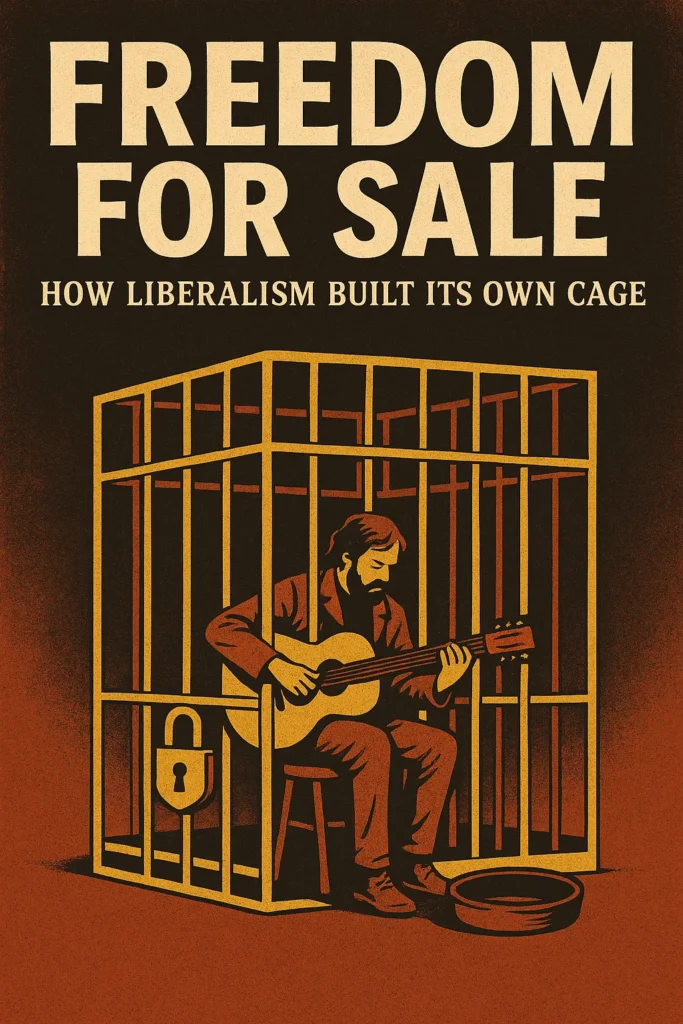Let me paint you a picture. You’re walking through the streets of a beautiful European city, maybe Barcelona. The sun is setting, casting long shadows across cobblestone alleys. Somewhere in the distance, a violin starts to sing. You follow the sound, expecting to find some scruffy genius pouring his soul into the strings, maybe with a dog asleep by his side and a hat for coins at his feet.
Instead? You find a laminated badge. A performer license. Maybe even a QR code for digital tips. It’s all very tidy, very sanctioned. And suddenly, what should have felt like a spark of spontaneity feels… curated. Controlled. Sanitized.
Welcome to the modern paradox: we are freer than ever, yet can’t do a damn thing without asking first.
The Illusion of Permissionless Freedom
Liberalism, in theory, should be the ideology of freedom. It claims to champion the individual, to unlock choice and mobility, to loosen the grip of tradition and authority. But in practice? It often just trades one form of control for another. Instead of the church, the monarch, or the patriarch, we now answer to the algorithm, the HR department, or the city council.
Busking, for example — the most basic form of artistic expression in public — now requires a permit. Sometimes even an audition. The streets used to belong to everyone. Now they belong to the brand of the city. And that brand wants culture, yes, but the safe, predictable kind. The kind that looks good on Instagram and won’t disturb the brunch crowd.
This is liberalism’s biggest contradiction: it promises freedom, but can’t seem to stop building cages around it.
From Spontaneity to Sanitation
Once upon a time, freedom meant risk. It meant rough edges. It meant you could just start playing music in the street without a PowerPoint presentation. But we’ve smoothed all that down in the name of order and accessibility.
We’ve professionalized everything. Want to make coffee? Better have barista training. Want to flip burgers? Might need a food safety certificate. Want to work retail? Hope you have a degree, or at least know how to smile through the slow death of your soul.
Everywhere you turn, there’s a hoop to jump through. And this isn’t just about music or food service. This is about how we treat people who don’t fit the system. The self-taught, the wanderers, the rebels. The ones who learn by doing, who create without permission, who speak without PR training.
Liberal societies love to fetishize creativity and individuality, but only when it’s profitable, palatable, and polished. The rest? Gets pushed to the margins.
The Bureaucratization of Being
So how did we get here? How did a philosophy built on freedom end up licensing our every move?
Part of it is just infrastructure. Modern life is complicated. There are more people, more risks, more systems that need to function smoothly. Rules help things run. Fair enough. But it didn’t stop there.
We didn’t just regulate for safety. We regulated for image, for consistency, for control. Cities market themselves now. Culture is a commodity. Every neighborhood is being rebranded into a lifestyle experience. And you can’t sell chaos. You can’t monetize unpredictability.
So we package it. We schedule it. We license it. Even dissent has to fit the calendar.
You see it in how protests get permits. How activists have PR teams. How every spontaneous gesture gets turned into content. It’s not that people stopped caring. It’s that the system got better at absorbing rebellion and turning it into a marketing strategy.
Freedom as a Product
The real kicker? Liberalism didn’t kill freedom. It just started selling it back to us.
Want to express yourself? There’s an app for that. Want to work on your terms? Here’s a gig economy job with no benefits. Want to be your own boss? Great, here’s 40 hours of YouTube ads about dropshitting and hustle culture.
Freedom becomes something you buy. A subscription. A service. A lifestyle brand. And if you can’t afford it? Well, then maybe you’re just not working hard enough.
But that’s not freedom. That’s just capitalism with a selfie filter.
The Soft Cage
Here’s the scariest part: this isn’t a dictatorship. No one’s forcing you to get a license to sing in the street. But if you don’t? You might get fined. Harassed. Moved along.
There’s no one screaming at you to conform. It’s subtler than that. It’s a look. A policy. An app update. A “terms of use” agreement you didn’t read.
The cage is soft. It’s made of convenience, incentives, and social pressure. It wraps itself around you slowly. Until one day you realize you haven’t done anything spontaneous in years.
You start asking yourself, every time you want to create, share, or speak: “Am I allowed to do this?” And the moment that question becomes automatic, you know something has shifted. You’re not free. You’re managed.
Is There Another Path?
Maybe. But it won’t be easy. The first step is seeing the cage for what it is. And that’s tough, because the bars are invisible, and everyone around you is acting like this is just normal.
But maybe we can start small. With moments of disobedience. With creation that doesn’t ask for approval. With saying no to platforms that extract more than they give. With saying yes to people who are messy, untrained, weird, and real.
Maybe the revolution isn’t loud. Maybe it’s quiet. A whisper in the street. A song with no permit. A truth that doesn’t fit the narrative.
We don’t need to burn it all down. But we do need to stop pretending this is the best we can do.
Liberalism gave us some incredible tools. It widened the circle. It gave voice to many who were silenced. But now? It’s time to ask: who holds the pen?
And are we really writing our own story, or just filling out someone else’s form?
